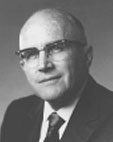Robert H. Pierson (1911 - 1989). Without sound preaching, the
church will soon
lose its way. This former General Conference president (1966–1979) sounded
a clarion note
of warning.
Only A.G. Daniells served longer than he as denominational president.
Pierson was a prolific writer.
He is credited with authoring some
28 books, many of them translated into multiple languages, as
well as hundreds
of articles.
Shortly before
his retirement, he delivered this earnest appeal to the leaders of the world church gathered for an Annual Council meeting on
October 15, 1978. His message
seems almost prophetic.
|
This will be the last time that in my present role I shall stand before the world leaders of my church, your church, our church, and I have a few words to leave with you.
I take my thoughts from something that Elder and Mrs. Ralph Neall have written describing how typically a sect evolves into a church. They say a sect is often begun by a charismatic leader with tremendous drive and commitment, and that it arises as a protest against worldliness and formalism in a church. It is generally embraced by the poor. The rich would lose too much by joining it, since it is unpopular, despised, and persecuted by society in general. It has definite beliefs firmly held by zealous members. Each member makes a personal decision to join it and knows what he believes. There is little organization or property, and there are few buildings. The group has strict standards and controls on behavior. Preachers, often without education, arise by inner compulsion. There is little concern about public relations.
And then it passes on to the second generation. With growth there comes a need for organization and buildings. As a result of industry and frugality, members become prosperous. As prosperity increases, persecution begins to wane. Children born into the movement do not have to make personal decisions to join it. They do not necessarily know what they believe. They do not need to hammer out their own positions. These have been worked out for them. Preachers arise more by selection and by apprenticeship to older workers than by direct inner compulsion.
In the third generation, organization develops and institutions are established. The need is seen for schools to pass on the faith of the fathers. Colleges are established. Members have to be exhorted to live up to the standards, while at the same time the standards of membership are being lowered. The group becomes lax about disfellowshipping nonpracticing members. Missionary zeal cools off. There is more concern over public relations. Leaders study methods of propagating their faith, sometimes employing extrinsic rewards as motivation for service by members. Youth question why they are different from others, and intermarry with those not of their faith.
In the fourth generation there is much machinery; the number of administrators increases while the number of workers at the grass roots becomes proportionately less. Great church councils are held to define doctrine. More schools, universities, and seminaries are established. These go to the world for accreditation and tend to become secularized. There is a reexamination of positions and modernizing of methods. Attention is given to contemporary culture, with an interest in the arts: music, architecture, literature. The movement seeks to become “relevant” to contemporary society by becoming involved in popular causes. Services become formal. The group enjoys complete acceptance by the world. The sect has become a church!
Brethren and sisters, this must never happen to the Seventh-day Adventist Church! This will not happen to the Seventh-day Adventist Church. This is not just another church—it is God’s church!
But you are the men and women sitting in this sanctuary this morning on whom God is counting to assure that it does not happen.
Already, brethren and sisters, there are subtle forces that are beginning to stir. Regrettably there are those in the church who belittle the inspiration of the Bible, who scorn the first 11 chapters of Genesis, who question the Spirit of Prophecy’s short chronology of the earth, and who subtly and not so subtly attack the Spirit of Prophecy. There are some who point to the Reformers and contemporary theologians as a source and the norm for Seventh-day Adventist doctrine. There are those who allegedly are tired of the hackneyed phrases of Adventism. There are those who wish to forget the standards of the church we love. There are those who covet and would court the favor of the evangelicals; those who would throw off the mantle of a peculiar people; and those who would go the way of the secular, materialistic world.
Fellow leaders, beloved brethren and sisters—don’t let it happen! I appeal to you as earnestly as I know how this morning—don’t let it happen! I appeal to Andrews University, to the Seminary, to Loma Linda University—don’t let it happen! We are not Seventh-day Anglicans, not Seventh-day Lutherans—we are Seventh-day Adventists! This is God’s last church with God’s last message.
You are the men and women, the leaders, whom God is counting on to keep the Seventh-day Adventist Church God’s remnant church, the church God has destined to triumph!
The servant of the Lord says, “Fearful perils are before those who bear responsibilities in the Lord’s work—perils the thought of which makes me tremble” (Selected Messages, bk. 2, p. 391). And in Ezekiel 22:30 we read, “I looked for a man among them who could build a barricade, who could stand before Me in the breach to defend the land from ruin” (NEB).
I believe this morning, fellow leaders, that God is looking for men and women, intrepid leaders, men and women who love God’s church and God’s truth more than they love their lives, to see that this church under God goes through to the kingdom. The task ahead of us is not going to be easy. If I understand the Bible and the Spirit of Prophecy aright this morning, ahead lies a time of trouble, a time of challenge such as this church and this world have never before known.
The servant of the Lord tells us: “The enemy of souls has sought to bring in the supposition that a great reformation was to take place among Seventh-day Adventists, and that this reformation would consist in giving up the doctrines which stand as the pillars of our faith, and engaging in a process of reorganization. Were this reformation to take place, what would result? The principles of truth that God in His wisdom has given to the remnant church, would be discarded. Our religion would be changed. The fundamental principles that have sustained the work for the last fifty years would be accounted as error. A new organization would be established. Books of a new order would be written. A system of intellectual philosophy would be introduced. The founders of this system would go into the cities, and do a wonderful work. The Sabbath of course, would be lightly regarded, as also the God Who created it. Nothing would be allowed to stand in the way of the new movement. The leaders would teach that virtue is better than vice, but God being removed, they would place their dependence on human power, which, without God, is worthless” (Selected Messages, bk. 1, pp. 204, 205).
The Seventh-day Adventist Church had its alpha years ago. You and I are the leaders who will face the omega that will be of the same subtle, devilish origin. Its effect will be more devastating than the alpha. Brethren, I beg of you, study, know what is ahead, then with God’s help prepare your people to meet it!
“God calls for men who are prepared to meet emergencies, men who in a crisis will not be found standing on the wrong side” (Review and Herald, November 5, 1903).
“We are pressing on to the final conflict, and this is no time for compromise. It is no time to hide your colors. When the battle wages sore, let no one turn traitor. It is no time to lay down or conceal our weapons, and give Satan the advantage in the warfare” (Review and Herald, December 6, 1892).
And then I call attention to a vision the Lord’s servant had, in which she saw a ship heading toward an iceberg. She said: “There, towering high above the ship, was a gigantic iceberg. An authoritative voice cried out, ‘Meet it!’ There was not a moment’s hesitation. It was a time for instant action. The engineer put on full steam, and the man at the wheel steered the ship straight into the iceberg. With a crash she struck the ice. There was a fearful shock, and the iceberg broke into many pieces, falling with a noise like thunder to the deck. The passengers were violently shaken by the force of the collision, but no lives were lost. The vessel was injured, but not beyond repair. She rebounded from the contact, trembling from stem to stern, like a living creature. Then she moved forward on her way.
“Well I knew the meaning of this representation. I had my orders. I had heard the words, like a voice from our Captain, ‘Meet it!’ I knew what my duty was, and that there was not a moment to lose. The time for decided action had come. I must without delay obey the command, ‘Meet it!’” (Selected Messages, bk. 1, pp. 205, 206).
Fellow leaders, it may be that in the not too distant future you will have to meet it. I pray God will give you grace and courage and wisdom.
Finally, “What a wonderful thought it is that the great controversy is nearing its end! In the closing work we shall meet with perils that we know not how to deal with; but let us not forget that the three great powers of Heaven are working, that a divine hand is on the wheel, and that God will bring His purposes to pass. He will gather from the world a people who will serve Him in righteousness” (Selected Messages, bk. 2, p. 391).
What a wonderful assurance we have this morning, brethren and sisters, that you and I are in God’s work. This work is not dependent on any man; it is dependent on our relationship with Him. There is only one way for us to face the future, and that is at the foot of the cross. A church with its eyes upon the Man of Calvary will never walk into apostasy.
Thank you, brethren and sisters, for giving me the privilege of serving you for the past 45 years, and may God bless every one of you. |

